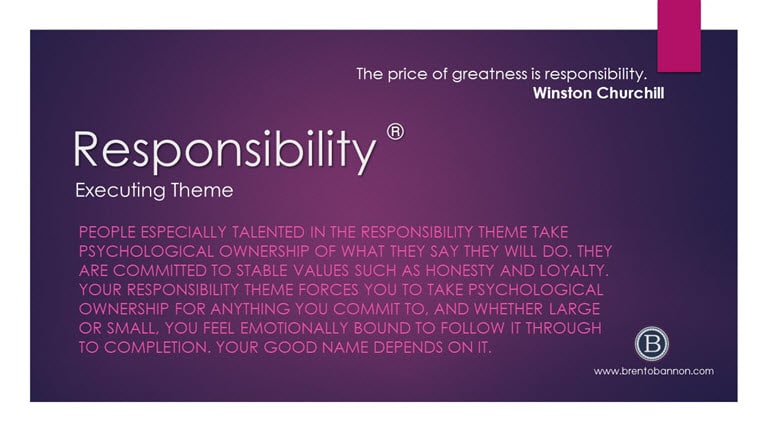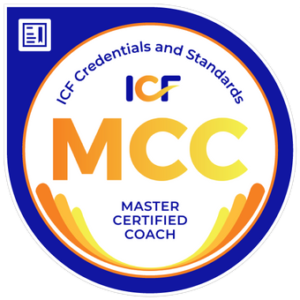
Do you love to see things through to completion? Do others see you as dependable and feel they can count on you? Are you a person who make commitments that align with and reflect your values? If these attributes define you, then you probably have the theme of Responsibility®
Janelle is a real estate broker, and one of my coaching clients. She owns her own real estate company and has several agents who work for her. Janelle’s strength is Responsibility. Incidentally, she just had an $8 million-dollar year.
I believe that Janelle’s ability to be so successful in the midst of a struggling economy comes from her strength of Responsibility—the talent of taking psychological ownership not only in her work but in her personal life. Janelle’s inner monologue is, “I need to be the rock. I need to be dependable. I need to get it done.”
Those with Responsibility as a top talent are conscientious of details, whether it’s completing detailed paperwork or paying attention to the body language of a nervous client. You are highly ethical and committed to following the rules.
People with the Responsibility strength are chronic volunteers. Wendy Kopp, founder of Teach for America, must have intuitively known this from the start. In 1989, Kopp proposed the creation of Teach for America in her undergraduate thesis at Princeton University. She was convinced that many in her generation were searching for a way to assume responsibility and make a real difference in the world.
Kopp grew up in a wealthy community in Dallas, Texas. At the time, she had little understanding that where you’re born plays a big part in your access to education. When she arrived at Princeton, all of that changed. She looked around and wondered why more wasn’t being done to channel people’s energy into teaching. Eventually, she decided to turn an idea into a thesis. She studied the Peace Corps, the federal Teacher Corps, and VISTA, and she ended up proposing the creation of something altogether new: A national teacher corps, what she later called Teach for America.
While Kopp’s thesis adviser liked the idea, he thought it was unrealistic, even a bit crazy. Why would recent Princeton grads, for example, volunteer to teach for two years in some of the toughest cities in America?
Later that year, Kopp came across a front-page article in Fortune magazine describing how corporate America was taking on education reform. Kopp wrote letters to everyone quoted in the article, and she got seven meetings. One was the CEO of Union Carbide, who offered to let her use one of the company’s offices in Manhattan and introduce her around. Then an exec at Mobile loved the idea enough to donate $26,000 to the cause. Today, more than 10,000 Teach for America corps members are in the midst of two-year teaching commitments in 50 urban and rural regions.
Volunteering comes naturally to people with Responsibility. Just be sure to volunteer for activities within your specialty or niche—and in the process, become an expert.
Responsibility can be overdone. Some people run the risk of overloading themselves or feeling burned out if they are not able to balance “yes” and “no” and allow others to take responsibility for their own mistakes.
So how do you, a solopreneur with a top strength of Responsibility, turn this strength into cash?
First, take psychological ownership for the things that matter most to you. Say you are a print journalist and you were recently laid off from one of the large news organizations. You now realize one of the most important things in your work life is having not one, but many streams of income.
The big question is, how do you monetize your knowledge as a journalist? That’s easy. You can write articles, of courses, but add writing books and e-books, public speaking, and podcasting to that. Don’t forget about offering online courses to other journalists whose jobs will soon to be on the chopping block.
Align yourself with others who share your sense of commitment. If your specialty is writing about government waste, for instance, consider new products and services that focus on this small sliver of the writing world. Seek out clients who care passionately about cost control. Contact government offices, foundations that rail about overspending, and non-profit organizations and offer to write newsletters, white papers, and opinion pieces on fiscal responsibility. You can also take your experience with government overspending and pitch the idea to for-profit corporations. Consider ghostwriting books and articles for executives and corporations looking to reduce costs, or those who had success with a business turn-around in which cost control played a significant role.
My point, look for clients and colleagues who take their responsibilities as seriously as you do. Once you do get a new product or service up and running, keep going. Create spin-off ideas; say you write a white paper about counterintuitive ways to prevent government overspending. Why not turn that paper into a seven-step online video training course? Next, turn that training course into a seven-part email campaign with links to your training videos (and an upsell to buy one or more of your e-books). Then for just one step in the training, collect all customer feedback in the form of success stories, and combine both the training materials and customer stories into a short e-book. At the end of each short e-book, offer a three-month consulting or coaching program that addresses this one narrow topic.
Don’t stop now. Why not create short e-books for each of your seven steps, with coaching programs for each? There’s nothing stopping you from then combining all seven short e-books into a full-sized book on the topic.
What if you reshaped your coaching program for all seven parts into a two-day live workshop for corporate clients and charged $10,000 for this two-day event? Put on a half-dozen workshops a year, and now you are earning what the average journalist earns by working a nine-to-five.
I just suggested eighteen separate products or services to sell—white paper, video training course, email campaign, seven short e-books, seven narrowly focused coaching programs, full-size book, and finally a two-day workshop. I could go on. If what’s important to you is multiple streams of income, you can easily turn a single great idea into a franchise with multiple products.
Do you have the StrengthsFinder theme of Responsibility? Which of the eighteen separate products or services to create your multiple streams of income? How does it help you create a clear destination? Please share your comments below.
Not sure which product or service is right for you, and you need some conversation around your unique strengths or building your business? Remember you can schedule your Ask Brent Anything call. Let’s talk about strengths.





